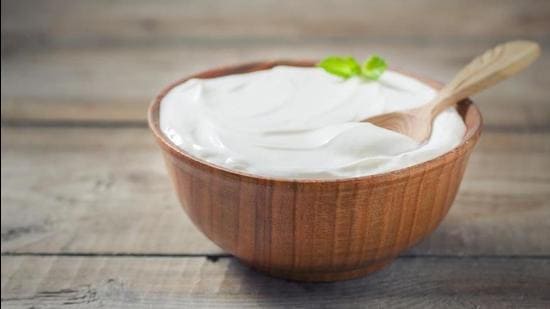
Here's what happens to your skin when you eat these superfoods
5 months ago | 5 Views
We are all obsessed with fancy skincare creams and spa treatments and tend to forget the pillar of glowing skin: food. Yes, what you eat can be just as crucial as your expensive serums and masks.
The World Health Organization (WHO) and other studies emphasise the importance of a balanced diet for skin health. Factors such as UV radiation, pollution and poor nutrition can accelerate skin ageing and inflammation but the right nutrients work behind the scenes, nourishing your skin cells, repairing damage and even creating a barrier against environmental stress.
In an interview with HT Lifestyle, Dr Govindarajan, Chief Innovation Officer at Kapiva, shared, “While creams and lotions can help, they’re just the finishing touch. True beauty starts from within, powered by vitamins, minerals, and healthy fats that your skin craves. Ayurvedic herbs like mulethi (licorice) can help brighten the skin and reduce pigmentation, while shatavari is known for its hydrating properties and support for overall skin vitality. So the next time you’re tempted by a miracle-in-a-jar, remember: a colourful, nutrient-packed meal, enriched with these powerful herbs, can do wonders for your skin. When you feed your body right, your skin will thank you with that natural, lit-from-within glow.”
Antioxidants: The skin’s protective shield
Dr Govindarajan revealed, “Antioxidants like Vitamin C and E play an important role in maintaining skin health. These vitamins are abundantly found in citrus fruits, green leafy vegetables, and nuts. Incorporating foods rich in Vitamin C—like oranges, spinach, and bell peppers—into your diet can naturally boost your skin’s radiance. Vitamin C, in particular, supports collagen production, an essential protein that keeps skin firm and elastic. Vitamin E, found in almonds and sunflower seeds, helps protect the skin’s lipid barrier, preventing moisture loss and keeping the skin hydrated. Incorporating these foods into your diet can significantly contribute to your skin's overall health and appearance.”

Omega-3 fatty acids: Building a strong skin barrier
Dr Govindarajan explained, “Fatty fish, for instance, salmon and plant sources like flax seeds are rich in Omega-3 fatty acids, playing a vital role in skin health. These healthy fats help reduce inflammation and support the skin’s lipid barrier, which protects against environmental irritants like pollution and UV rays. Omega-3 fatty acids also benefit in managing skin conditions such as acne and eczema. By including these fats in your diet, you can achieve smoother, more resilient skin while minimising redness and breakouts.”

Zinc: The unsung hero of skin health
Zinc, an underrated mineral, is essential for skin repair and oil control. Dr Govindarajan elaborated, “It plays a significant role in cell regeneration and wound healing. For individuals dealing with acne or excessive oiliness, zinc helps control sebum, the skin's natural oil, thereby lowering the risk of clogged pores. Regularly consuming zinc-rich foods like legumes, pumpkin seeds, chickpeas, and lean meat provides your body with the necessary nutrients for a balanced and clear skin. Maintaining adequate zinc levels not only promotes skin health but also enhances its overall appearance, making it an important addition to your diet for achieving vibrant skin.”

Probiotics: A healthy gut for healthy skin
Dr Govindarajan highlighted, “Probiotics have an important role to play in digesting nutrients essential for skin health, ensuring that your body absorbs the vitamins and minerals needed for optimal skin function. Found in fermented foods like yoghurt, kimchi, and sauerkraut, probiotics support a healthy gut microbiome, which contributes to improved skin health. A balanced gut can help reduce inflammation, manage acne breakouts, and prevent conditions such as eczema and rosacea. By including probiotic-rich foods in your diet, you not only boost your digestive health but also enhance your skin's appearance, leading to a clearer and more radiant complexion. This connection between gut health and skin vitality is important for overall well-being.”

Hydration and glow: The secret to glowing skin
It is no secret that vitamins A, C and E contribute to that elusive glow. Dr Govindarajan informed, “These nutrients help to repair skin damage, promote cell turnover, and improve skin elasticity, resulting in a smoother, more luminous appearance. Eating a rainbow of fruits and vegetables ensures that your skin receives a wide range of vitamins for a dewy and healthy look. Water supports skin cell function, promotes detoxification, and helps deliver nutrients to your skin cells. Beyond drinking water, foods rich in water content, such as cucumbers, tomatoes and melons, contribute to skin hydration from the inside out.”
Protection from environmental damage
We are constantly exposed to environmental stressors, such as UV rays, pollution, and toxins, which can take a toll on our skin. Dr Govindarajan suggested, “Nutrients like antioxidants and healthy fats form a natural barrier that protects the skin from these external aggressors. Omega-3 fatty acids fortify the skin’s lipid barrier, preventing harmful particles from penetrating the skin. Meanwhile, antioxidants repair damage and prevent oxidative stress, keeping skin resilient and youthful. Incorporating foods like berries and leafy greens into your diet can give your skin the protection it needs to combat daily environmental stressors and maintain a vibrant, healthy appearance.”
He asserted, “Improving your skin starts with what you eat. Picture filling your plate with colourful, antioxidant-rich foods, healthy fats, zinc, and probiotics. These nutrients not only boost your overall health but also work wonders for your skin. Over time, you’ll notice a more youthful, hydrated, and radiant skin. Each meal is an opportunity to nourish your skin from the inside out, tackling issues like inflammation, dryness, and premature ageing at their source. Your diet is one of the most effective ways to achieve long-term skin health. By giving your body the right nutrients, you’re creating a foundation for natural beauty that no product can match. So, think of mealtime as a chance to support your inner glow and vitality.”





















